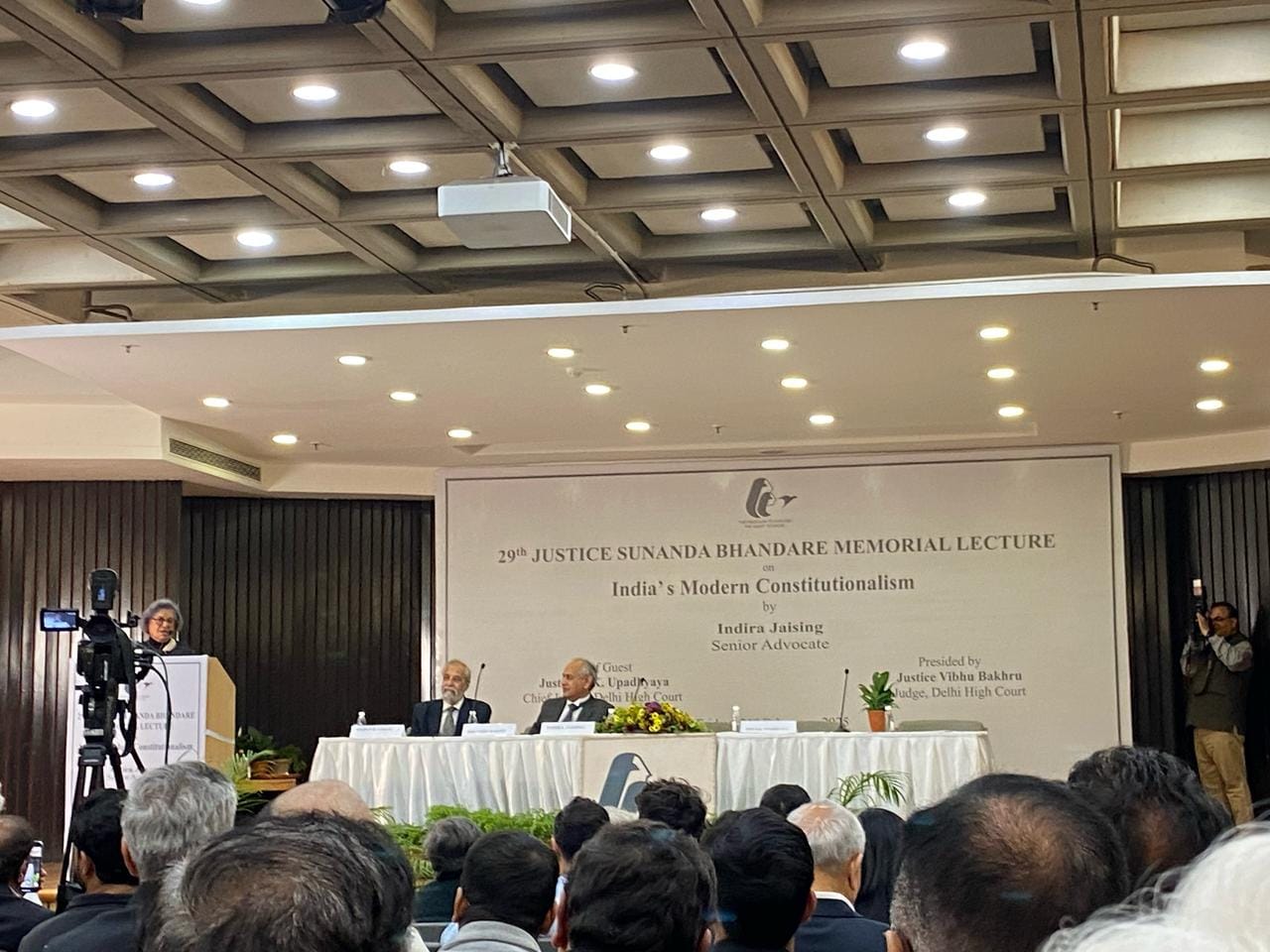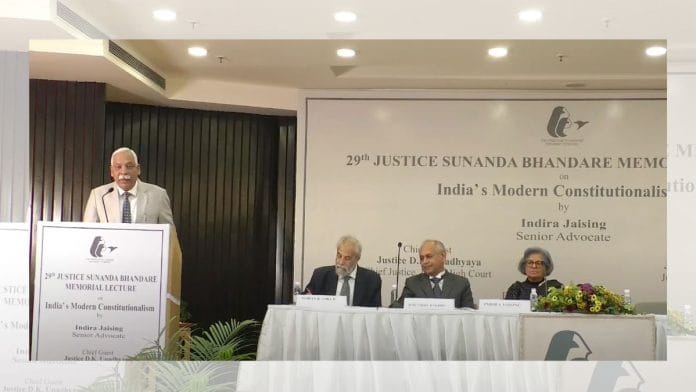New Delhi: The adoption of the Indian Constitution was a momentous step in replacing fundamental wrongs with fundamental rights, Delhi High Court Chief Justice D.K. Upadhyay has said.
Speaking at the 29th Justice Sunanda Bhandare Memorial Lecture at the India International Centre in New Delhi Friday, Justice Upadhyay further said, “As noted by constitutional historian Granville Austin, the adoption of the Indian Constitution was a momentous step in replacing fundamental wrongs with fundamental rights.”
“One of the most significant contributions of the Constitution was its commitment to equality,” he added.
The theme for this year’s lecture was ‘India’s Modern Constitutionalism’. The event also witnessed speeches from Justice Vibhu Bakhru, former Chief Justice of Guwahati and Andhra Pradesh High Court Justice Madan B. Lokur, and senior advocate Indira Jaising.
Defining the term “constitutionalism” as a set of legal concepts that shaped the world, such as the rule of law, separation of power, public accountability, and basic structure, Justice Upadhyay said that the judiciary has also played a key role in expanding its definition in the country by broadening the ambit of Article 21 (right to life) to include the right to live with dignity, the right to a fair trial, and the right against sexual harassment, among others.
Having a Constitution and practising constitutionalism are two different things, Justice Upadhyay also said. At the same time, the framers of the Constitution learned from the mistakes of other countries.
In his writings before the establishment of the Constituent Assembly, Dr Ambedkar had argued for the inclusion of affirmative action provisions in the Constitution, the judge told the audience.
“Dr. Ambedkar spoke of the situation in the United States where due to lack of constitutional provisions, the rights of African Americans were violated, necessitating subsequent amendments.” In response, India took a step ahead and explicitly incorporated affirmative actions under Articles 15.4 and 16.4 to ensure equal opportunities in education and the environment.
The principle of separation of power was also adopted in the Constitution, dividing authority among the legislature, the executive and the judiciary, he added.
“We must also acknowledge the role of constitutional courts in filling up constitutional silences. For instance, courts have referred to the principle of collective responsibility as an inherent principle of parliamentary democracy,” he said.
Citing the words of former Cambridge University vice-chancellor Sir Ivor Jennings, who was instrumental in advising countries like Nepal, Sri Lanka, and Pakistan on the framing of their constitutions, Justice Upadhyay said, “Sir William Ivor Jennings was the fiercest critic of the Indian Constitution and called our Constitution a lawyer’s paradise. But the irony is that while Sri Lanka’s Constitution lasted only for 14 years, India’s Constitution celebrates its 75th year.”

On the subject of constitutionalism, senior advocate Indira Jaising said, “Constitutionalism does impose limitations on state power. That’s what it really is. Today, we notice there is a demand to put an end to constitutionalism.”
However, the Constitution is a binding norm, she said, while adding that it addresses itself to the future generations building the nation we wish to see, and not to those “who wish to return to the power structures of centuries gone by.”
Also Read: How Yamuna’s shifting course has fuelled a decades-long land ownership tussle between Haryana & UP
Justice Lokur’s memorable anecdote
Justice Lokur began his speech by highlighting that the absence of the late Murlidhar C. Bhandare, the managing trustee of the Justice Sunanda Bhandare Foundation, was felt at the event this year.
M.C. Bhandare was a senior advocate practising mainly in the Supreme Court and was twice the president of the Supreme Court Bar Association between 1986 and 1988. He was also the husband of the late Justice Sunanda Bhandare, a three-time Rajya Sabha member.
“This is the first memorial lecture where we are missing the presence of the managing trustee of the Justice Sunanda Bhandare Foundation. Unfortunately, he passed away last year on 15th April 2024 at the age of 95. I refrain from saying old age since Mr. Bhandare was always young at heart,” he said.
Justice Lokur then went on to talk about the late Justice Sunanda Bhandare, who started her career as a lawyer and later became a judge of the Delhi HC in 1994 at the relatively young age of 41.
“It is widely acknowledged that given her legal acumen, her impartiality, and her dedication to the cause of justice, it was only a matter of time before she would be appointed a judge of the Supreme Court and later the first woman Chief Justice of India,” he said. However, due to her untimely demise in November 1994, when she was only 51, this could not happen.
Charged with a passion for justice and social change, Justice Bhandare attended court and performed her duties, even after she was diagnosed with cancer, he said.
“Just a few days before her visit to London for treatment, she delivered a 78-page judgment on an issue concerning the army relating to the dismissal of personnel,” the former judge said.
Dubbing Justice Bhandare as a “very down-to-earth person” who was well-known among the shopkeepers at Delhi’s INA market, where she would do her vegetable shopping, Justice Lokur said, “It is this attitude that made her a humane and compassionate judge who upheld the rights and dignity of individuals. It is only fitting that her legacy has been carried forward by the Justice Sunanda Bhandare Foundation, established in 1995 on the initiative of Murlidhar C. Bhandare.
Indira Jaising’s cracker of a speech
Jaising began her speech by recalling her time as one of Muralidhar Bhandare’s students at the Government Law College, Bombay. “The truth of the matter, however, is that I hardly ever attended his classes. A part of the reason why he was so fond of me was that I would always enter the classroom late, and even though I say it myself, I was young and beautiful, and he was totally distracted.”
Recalling a time when she was thrown out of GLC Mumbai for lack of attendance, Jaising said, “It was Murlidhar Bhandare who picked a fight with the principal and said, ‘Don’t throw her out.” However, the principal insisted, she said.
Subsequently, Jaisingh promptly joined the Siddharth Law College, which was founded by Dr. B.R. Ambedkar. “When the exam results were declared, I got a first class. Muralidhar then went to the principal and said, “Look what you’ve done; you lost a first class for your college.’’ That year, no one at GLC Bombay got a first class, she said.
(Edited by Sanya Mathur)
Also Read: SC strongly slams NMC’s ‘both hands intact’ rule for MBBS aspirants with disability. What it said






